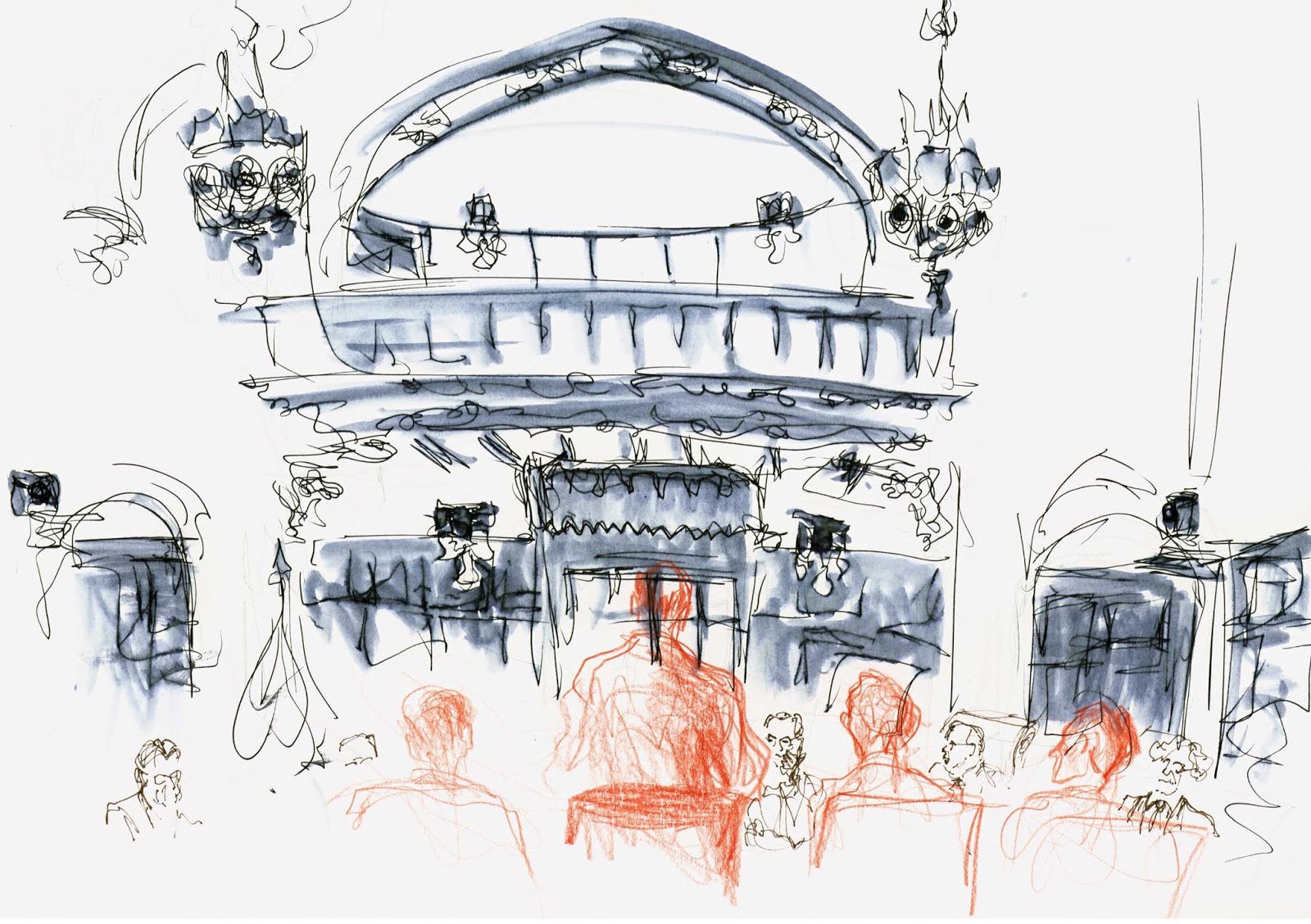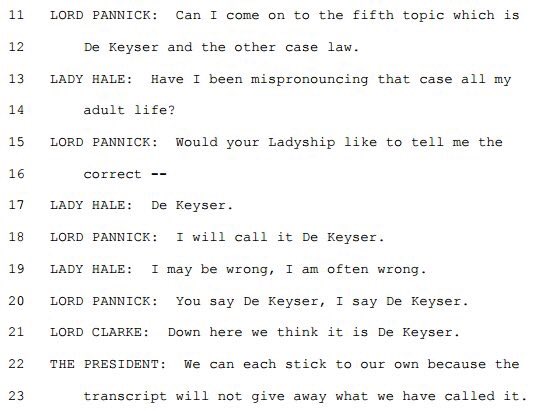Weekly Notes: legal news from ICLR — 12 December 2016
This week’s roundup goes from the sublime to the ridiculous as we find supreme intelligence in the Supreme Court and supreme ignorance in some parts of Parliament; plus the problems of advising unrepresented litigants and impatient young musical geniuses; and we end on a sad note with the passing of the much loved Prof Gary… Continue reading
This week’s roundup goes from the sublime to the ridiculous as we find supreme intelligence in the Supreme Court and supreme ignorance in some parts of Parliament; plus the problems of advising unrepresented litigants and impatient young musical geniuses; and we end on a sad note with the passing of the much loved Prof Gary Slapper, to whose memory this post is dedicated.
Supreme Court
Trial run of Large Caselaw Collider
The scientific community looked on with bated breath last week as the vast machinery of the Large Caselaw Collider was set in motion in a daring experiment to find the smallest discernible particle of constitutional law, previously known as a “quirk” (or to give it its full name, “quirk of the constitution”).
The Collider works by firing two opposing streams of legal argument from each side through a long curved structure, known as the “bench”, along which are located eleven “justices”. Their electrifying “interventions” help deflect the opposing streams of caselaw, thus giving rise to a detectible event, known as a “precedent”.
Substitute law geeks for the scientific community and you may get some idea why we think Supreme Court hearings are worth televising and discussing on Twitter (as many did). But it’s not just about caselaw and precedent and the quarks (or Higgs bosons) in our unwritten constitution. The Brexit appeal had a bit of everything.
It was important politically, mainly because the Prime Minister, Theresa May, chose to make it so, by pursuing an appeal against the unanimous and unambiguous High Court judgment in R (Miller & anr) v Secretary of State for Exiting the European Union [2016] EWHC 2768 (Admin) ; [2016] WLR(D) 564.
But in the same week as this appeal there was a vote in Parliament which, had it asked the right question, could have obviated any need for such an appeal. For the whole point of the case was to establish the need for a parliamentary vote. This week’s vote was triggered by a Labour motion demanding Theresa May to publish a “plan” setting out her negotiating objectives before she triggers Article 50. Mrs May reluctantly agreed, and MPs voted by 448 to 75 votes – a majority of 373 — to endorse the Brexit vote in June’s referendum and to back Mrs May’s timetable for exit. But it was on a non-binding Labour motion, so the vote can’t replace the one called for in the Miller case, which would legitimise the removal of rights accorded by the European Communities Act 1972 which triggering article 50 would cause. (See Guardian, Brexit: Keir Starmer presses for ‘detailed’ plan as MPs vote to trigger article 50.)
The case was also, in its own way, rather entertaining. No one was dressed up in funny costumes, no one banged a gavel or shouted “objection”, but there was drama for those equipped to detect it, in the nuance and subtext of legal submissions, the “bundle banter” about tabs in files full of printed out law reports; and the urbane if sometimes obscure wit of the advocates. No wonder more than 300,000 people watched the live stream from the court’s website on Monday. (The previous record had been 20,000 for a hearing about a celebrity threesome, according to the Times.)
Variable coverage
Some newspapers didn’t seem to know how to report it. The Times concentrated on Lord Sumption’s ties, which it said looked as though they came from a charity shop. Actually, one of them had Union Jacks on it, so I think it might even have been a Kipper tie (b-boom!).
The Telegraph on Saturday came up with a flimsily speculative attempt to call the result, suggesting that some “Government sources believe” the 11 Justices of the Supreme Court are
are split over their historic Article 50 ruling, and look set to decide by a majority of seven to four to give Parliament a vote on when Britain leaves the European Union…”
Anyone who thinks “government sources” can have any idea at all about how the justices are thinking is either mad or very ignorant; the whole reason why in 2009 the Supreme Court moved out of the Houses of Parliament (it previously sat as a committee of the House of Lords) and across Westminster Square to occupy its present location in a former Middlesex County Court building, and does not even share any suffixes in its URL with the government’s websites, was to underscore, visibly, the existing fact of its complete separation as a power from both Parliament and the Executive. Not even the lawyers who acted in the case know how the Justices are going to decide. They may have guessed, but it’s a risky business. There was no giveaway line from the bench, was there, like “Mr X I need not trouble you to reply” (ie, you’ve won, relax)?
For the Telegraph, building a house of cards on the shifting sands of its wholly unfounded speculation, “The news that more judges than expected could back the Government’s argument is a boost for the Brexit side”. Well yes, it would be, wouldn’t it? Except that it isn’t actually news. It’s just a cheese’n’onion flavoured rumour.
The fact that the Telegraph page lists among the Justices a certain “Lord Hudges” — they seem to have confused Lord Hughes and Lord Hodge — suggests it may have been put together by a “moron in a hurry” (see Morning Star Co-Operative Society Ltd v Express Newspapers Ltd [1979] FSR 113 at 117, per Foster J).
Talking of Express Newspapers, their coverage was suitably punchy, informing readers how they could watch the appeal against a “bombshell victory by pro-EU campaigners” by going to the Supreme Court website (from which most of the rest of the paper’s article was then copied out). Another article, published in the Express on Saturday, copies the Telegraph story about “government advisers” and their “7:4 Remainers’ victory” prediction. It also features a more or less irrelevant video of Nigel Farage.
The Daily Mail decided to splash out on some expert commentary, recruiting Ian Duncan Smith, former Tory Minister for Improving the Lot of the Poor, whose article was entitled Why it’s crucial that the judges who could decide the fate of Brexit ARE scrutinised.
He began by rudely saying the proceedings were “like watching paint dry” and then proceeded to demonstrate a number of what might politely be called “misunderstandings” about the nature, purpose and effect of the hearing in the Supreme Court. The poor man does seem very confused, in one paragraph claiming that, when the Law Lords sat in the House of Lords that meant “the supremacy of Parliament was assured” whereas now, sitting across the square, if they dismissed the appeal and parliament was given a vote on article 50 in consequence of their ruling, well, er, what then?
Just imagine if the Supreme Court upholds the High Court’s decision, and Parliament is required to vote on the triggering of Article 50. What if Parliament rejects the invoking of that article and so stops Britain from leaving the EU at all?”
What indeed. So in IDS’s view giving Parliament the vote over something means they are not supreme, but denying them the vote means they are supreme. Or something.
The article was the subject of a very entertaining series of tweets by The Secret Barrister (@BarristerSecret) pointing out all the errors in IDS’s “litany of stupid”. These were turned into an article in Huffington Post, Iain Duncan Smith’s Supreme Court Brexit Daily Mail Column Is Eviscerated In 17 Tweets By The Secret Barrister.
Better coverage
There was, of course, some very good coverage of the four day hearing. David Allen Green wrote it up each day in the Financial Times, Joshua Rozenberg on Sky News, and a full transcript of the hearing was posted on the Supreme Court’s own case “hub page” for each half-day session. In fact, for the Supreme Court it was a supreme example of open justice and transparency, really leading the way all courts should aspire to follow.
For a discussion of the implications of all this access to information, particularly for journalists and the public, see David Burrows’ post on this blog,
Miller: hearing documents and understanding a case in the Supreme Court.
For links to some of the supporting materials and discussion of their use, see this post by Law and Lawyers blogger Obiter J, The Brexit appeal ~ mountains of material. The blog has a number of other posts about the hearing, with lots of useful links to the arguments and caselaw.
There was also a more personal take on the hearings from the artist, Isobel Williams, who has done so much to respond to the Supreme Court’s transparency, including its permission to draw within the court room itself (something not permitted in other courts) – and some of her drawings do seem to play on the idea of “transparency”, with figures seen as though through other figures (see image shown). Her three blog posts may be found here:
- Supreme Court: Article 50
- Supreme Court: more Article 50 action
- Supreme Court: last day of Article 50 hearing
Seen the hearing? Now get the T-shirt
The hearing was not without its lighter moments. There was a memorable exchange between Lord Pannick QC (counsel for the claimant Miller) and Baroness Hale JSC and the other Justices, over the correct pronunciation of the name “De Keyser” in the well known case of Attorney-General v De Keyser’s Royal Hotel Ltd [1920] AC 508, HL(E). [Read the case report PDF.]
(HT David Banks, who tweets as @DBanksy, for image). You can even hear the exchange, thanks to a neat edit posted on Twitter by Esther Webber (@estwebber). The exchange provoked a good deal of commentary on Twitter but it went further than that. Following a suggestion by Richard Moorhead, Professor of Law at University College, London, a set of T-shirts celebrating the moment went on sale via the Billable Hour refugee charity set up last year by Sean Jones QC. The profits from each T-shirt sold will be donated to Save the Children, to help refugee children.

Intellectual Property
Duran Duran defeated
It’s the old, old story. Talented youngster spotted by agent/ publisher/ record company signs contract with the same, expecting all the rewards of stardom, only to find, years later, that things were not so simple. In the case of Duran Duran, the talented 1980s pop group whose musical intelligence was probably not appreciated by most of their fans as much as the glossy lifestyle projected in their videos, the problem seems to have been that they signed away their “entire copyrights” to a publishing company now called Gloucester Place Music Ltd and owned by the Sony/ATV group. In the case of Gloucester Place Music Ltd v Le Bon & Ors [2016] EWHC 3091 (Ch), Arnold J held that, as the contract was governed by English contract law, the group members were unable to rely on a provision of US copyright law to claim a reversion of their copyrights. In fact, even serving notice to claim such a reversion constituted a breach of the English contract. He said
the language of the copyright agreements “would have conveyed to a reasonable person… that the parties’ intention was that the ‘entire copyrights’ in the compositions should vest, and remain vested, in the claimant (Gloucester Place) for the ‘full term’ of the copyrights.”
Nick Rhodes, one of the band members involved, said the case “sets a very bad precedent for all songwriters of our era.” The case is rather more competently explained on the IPKat blog (Wild Boys Sometimes Lose It: Duran Duran fail to reclaim their US copyright) , which expresses the opinion that the conflict of laws point could have been more strenuously argued and an appeal might be worth pursuing. Nevertheless,
Arnold J’s decision serves a salutory purpose, reminding anyone signing a publishing agreement that the court will interpret the agreement from the viewpoint of a reasonable person with the necessary background information, including some knowledge of copyright law. This makes obtaining good advice all the more critical when the bargaining position is unequal.”
Unified Patent Court
In a somewhat surprising move, given the general uncertainty over anything vaguely continental, the UK government has confirmed it is proceeding with preparations to ratify the Unified Patent Court Agreement (UPCA). According to the announcement from the Intellectual Property Office:
Under the new regime, businesses will be able to protect and enforce their patent rights across Europe in a more streamlined way – with a single patent and through a single patent court. The court will make it easier for British businesses to protect their ideas and inventions from being illegally copied by companies in other countries.
But as the IPO announcement makes clear, this is not something necessarily affected by Brexit. The UPC itself is not an EU institution, it is an international patent court, whose judiciary would include UK judges.
Prisons
Drone dogs
People have criticised the present Lord Chancellor and Secretary of State for Justice for many things, but I don’t think Liz Truss MP can be criticised for lacking imagination in her approach to prison discipline. Though some may say she is barking up the wrong tree on this one, she did apparently suggest in all seriousness that guard dogs could help deter drones from delivering contraband items to prisoners simply by barking at them (the drones, that is). According to Politics Home,
Speaking during Justice Questions, the Cabinet minister said the Government was reviewing measures such as extra netting, before adding:
“I was at HMP Pentonville last week. They’ve now got patrol dogs who are barking, which helps deter drones. So we are using all kinds of solutions to deal with contraband coming into our prison.”
Sometimes one is tempted to suggest pulling the other one, to hear the sound of the bells, but if we are being too sceptical and someone has evidence that the unmanned remote controlled airbourne vehicles do indeed respond to the aggressive barking of dogs, we will provide a sensible link to any research.
Legal services
Litigants in person and untrained assistants
Litigants in person have been in the news this week for two reasons. First, because they can cause a lot of trouble and waste a lot of time, according to Lady Justice King, sitting in the Court of Appeal, who added a postscript to her judgment in Agarwala v Agarwala [2016] EWCA Civ 1252 complaining that:
both parties, incapable of compromise, have bombarded the court with endless applications” and “court staff and judge have been inundated with emails”.
Whilst sympathetic to the plight of unrepresented litigants, she said, at para 72:
In my view judges must be entitled, as part of their general case management powers, to put in place, where they feel it to be appropriate, strict directions regulating communications with the court and litigants should understand that failure to comply with such directions will mean that communications that they choose to send, notwithstanding those directions, will be neither responded to nor acted upon.
Meanwhile, as noted in the Law Society Gazette,
The ongoing issue of litigants in person has come into focus this week with the suggestion from Master of the Rolls, Sir Terence Etherton that law graduates could help to plug the advice gap by representing people in court proceedings. Etherton said this option would be a ‘far better’ way to address the issue than relying on unregulated and uninsured McKenzie friends.”
Speaking at the LawWorks annual Pro Bono Awards on 5 December, the Master of the Rolls outlined a three-point plan for an expanded pro bono advice scheme for consideration by government, judiciary and regulators. The plan is explained in more detail in another article in the Gazette: Let graduates represent litigants in person – master of the rolls.
See also: Legal Futures, Oversupply of law graduates and growing number of LiPs are solution to each other’s problem, says MR
Not everyone was in favour of the idea, however. The solicitor advocate Nicholas Diable, blogging as Defence Brief, set out his reasons for thinking that Sir Terence’s idea is
flawed legally, practically and ethically. It simultaneously undermines high quality representation, places litigants at a disadvantage when facing wealthier opposition and will create a two-tier justice system with those at the bottom at real risk of losing out.
And finally…
Gary Slapper
We received the sad news this week that Professor Gary Slapper, global professor at New York University (NYU) and director of its campus in London, has died. Slapper was the co-author, with Dr David Kelly, of The English Legal System, reviewed here. He also published a number of collections of his Weird Cases column from the Times law section, one of which we also reviewed here.
He was a popular teacher and well known commentator on legal issues, whose Twitter feed was full of advice for students, witty observations and trenchant defences of the rule of law and (recently) the independence of the judiciary. Here are some examples:
do you serve lawyers? pic.twitter.com/lQIwcQDbRl
— Gary Slapper (@garyslapper) November 29, 2016
the art of imperturbability, #1 the pivot pic.twitter.com/aAbDfQEpu6
— Gary Slapper (@garyslapper) November 23, 2016
my lord… pic.twitter.com/VfM7XPHCkp
— Gary Slapper (@garyslapper) November 25, 2016
And on a rather more serious matter:
the sound of silence #wheresLizTruss pic.twitter.com/ySkbb8iN77
— Gary Slapper (@garyslapper) November 5, 2016
Gary Slapper was also a good friend to ICLR and the Law Reports, memorably hosting an evening of legal comedy at the Law Society as part of our ICLR Encounters series in 2012. (See Close Encounters of the Third Kind: the law, a funny old business.) He will be greatly missed.
That’s it for now. Our thanks to all who flagged up stories, via their blogs (which we always try to acknowledge) and via Twitter (where useful tweets are retweeted).
This post was written by Paul Magrath, Head of Product Development and Online Content at ICLR, who also tweets as @maggotlaw. It does not necessarily represent the opinions of ICLR as an organisation. Comments welcome on Twitter @TheICLR.
Sign up now for weekly email alerts from this blog. Just put your email address into the box on the left.



